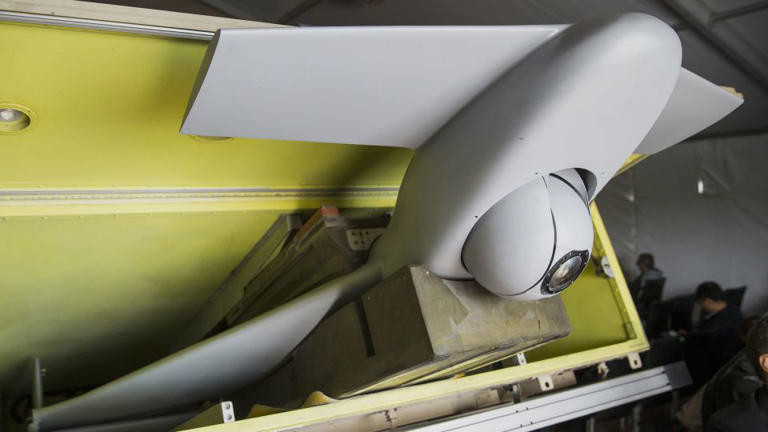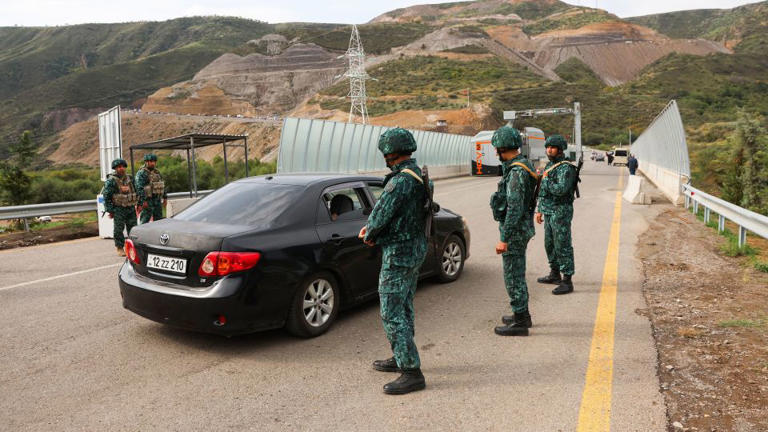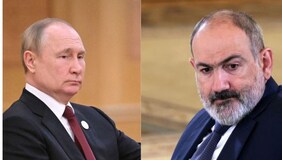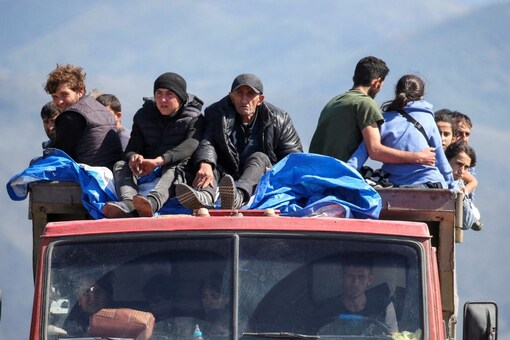Ethnic Armenians from Nagorno-Karabakh travel on a truck on their way to Kornidzor, Armenia, on Sept. 26, 2023. Israel has quietly helped fuel Azerbaijan’s campaign to recapture Nagorno-Karabakh, officials and experts say, supplying powerful weapons to Azerbaijan ahead of its lightening offensive last month that brought the Armenian enclave in its territory back under its control.
A convoy of cars of ethnic Armenians from Nagorno-Karabakh move to Kornidzor in Syunik region, Armenia, on Sept. 26, 2023. Israel has quietly helped fuel Azerbaijan’s campaign to recapture Nagorno-Karabakh, officials and experts say, supplying powerful weapons to Azerbaijan ahead of its lightening offensive last month that brought the Armenian enclave in its territory back under its control.
An ethnic Armenian woman from Nagorno-Karabakh sits inside an old Soviet style car as she arrives in Goris, in Syunik region, Armenia, on Sept. 27, 2023. Israel has quietly helped fuel Azerbaijan’s campaign to recapture Nagorno-Karabakh, officials and experts say, supplying powerful weapons to Azerbaijan ahead of its lightening offensive last month that brought the Armenian enclave in its territory back under its control.
BY ISABEL DEBRE
October 5, 2023
TEL AVIV, Israel (AP) — Israel has quietly helped fuel Azerbaijan’s campaign to recapture Nagorno-Karabakh, supplying powerful weapons to Azerbaijan ahead of its lightening offensive last month that brought the ethnic Armenian enclave back under its control, officials and experts say.
Just weeks before Azerbaijan launched its 24-hour assault on Sept. 19, Azerbaijani military cargo planes repeatedly flew between a southern Israeli airbase and an airfield near Nagorno-Karabakh, according to flight tracking data and Armenian diplomats, even as Western governments were urging peace talks.
The flights rattled Armenian officials in Yerevan, long wary of the strategic alliance between Israel and Azerbaijan, and shined a light on Israel’s national interests in the restive region south of the Caucasus Mountains.
“For us, it is a major concern that Israeli weapons have been firing at our people,” Arman Akopian, Armenia’s ambassador to Israel, told The Associated Press. In a flurry of diplomatic exchanges, Akopian said he expressed alarm to Israeli politicians and lawmakers in recent weeks over Israeli weapons shipments.
RELATED COVERAGE
Azerbaijan arrests several former top separatist leaders of Nagorno-Karabakh
Azerbaijan moves to reaffirm control of Nagorno-Karabakh as the Armenian exodus slows to a trickle
Over half of Nagorno-Karabakh’s population flees as the separatist government says it will dissolve
“I don’t see why Israel should not be in the position to express at least some concern about the fate of people being expelled from their homeland,” he told AP.
Azerbaijan’s September blitz involving heavy artillery, rocket launchers and drones — largely supplied by Israel and Turkey, according to experts — forced Armenian separatist authorities to lay down their weapons and sit down for talks on the future of the separatist region.
The Azerbaijani offensive killed over 200 Armenians in the enclave, the vast majority of them fighters, and some 200 Azerbaijani troops, according to officials.
There are ramifications beyond the volatile enclave of 4,400 square kilometers (1,700 square miles). The fighting prompted over 100,000 people — more than 80% of the enclave’s ethnic Armenian residents — to flee in the last two weeks. Azerbaijan has pledged to respect the rights of ethnic Armenians.
Armenian Prime Minister Nikol Pashinyan has termed the exodus “a direct act of an ethnic cleansing.” Azerbaijan’s Foreign Ministry strongly rejected the accusation, saying the departures are a “personal and individual decision and (have) nothing to do with forced relocation.”
Israel’s foreign and defense ministries declined to comment on the use of Israeli weapons in Nagorno-Karabakh or on Armenian concerns about its military partnership with Azerbaijan. In July, Israeli Defense Minister Yoav Gallant visited Baku, the Azerbaijan capital, where he praised the countries’ military cooperation and joint “fight against terrorism.”
Israel has a big stake in Azerbaijan, which serves as a critical source of oil and is a staunch ally against Israel’s archenemy Iran. It is also a lucrative customer of sophisticated arms.
“There’s no doubt about our position in support of Azerbaijan’s defense,” said Arkady Mil-man, Israel’s former ambassador to Azerbaijan and current senior researcher at the Institute for National Security Studies in Tel Aviv. “We have a strategic partnership to contain Iran.”
Although once resource-poor Israel now has plenty of natural gas off its Mediterranean coast, Azerbaijan still supplies at least 40% of Israel’s oil needs, keeping cars and trucks on its roads. Israel turned to Baku’s offshore deposits in the late 1990s, creating an oil pipeline through the Turkish transport hub of Ceyan that isolated Iran, which at the time capitalized on oil flowing through its pipelines from Kazakhstan to world markets.
Azerbaijan has long been suspicious of Iran, its fellow Shiite Muslim neighbor on the Caspian Sea, and chafed at its support for Armenia, which is Christian. Iran has accused Azerbaijan of hosting a base for Israeli intelligence operations against it — a claim that Azerbaijan and Israel deny.
“It’s clear to us that Israel has an interest in keeping a military presence in Azerbaijan, using its territory to observe Iran,” Armenian diplomat Tigran Balayan said.
Few have benefited more from the two countries’ close relations than Israeli military contractors. Experts estimate Israel supplied Azerbaijan with nearly 70% of its arsenal between 2016 and 2020 — giving Azerbaijan an edge against Armenia and boosting Israel’s large defense industry.
“Israeli arms have played a very significant role in allowing the Azerbaijani army to reach its objectives,” said Pieter Wezeman, senior researcher at the Stockholm International Peace Research Institute, which tracks arms sales.
Israeli long-range missiles and exploding drones known as loitering munitions have made up for Azerbaijan’s small air force, Wezeman said, even at times striking deep within Armenia itself. Meanwhile, Israeli Barak-8 surface-to-air missiles have protected Azerbaijan’s airspace in shooting down missiles and drones, he added.
Just ahead of last month’s offensive, the Azerbaijani defense ministry announced the army conducted a missile test of Barak-8. Its developer, Israel Aerospace Industries, declined to comment on Azerbaijan’s use of its air defense system and combat drones.
But Azerbaijan has raved about the success of Israeli drones in slicing through the Armenian defenses and tipping the balance in the bloody six-week war in 2020.
Its defense minister in 2016 called a combat drone manufactured by Israel’s Aeronautics Group “a nightmare for the Armenian army,” which backed the region’s separatists during Azerbaijan’s conflict with Nagorno-Karabakh that year.
President Ilham Aliyev in 2021 — a year of deadly Azerbaijan-Armenian border clashes — was captured on camera smiling as he stroked the small Israeli suicide drone “Harop” during an arms showcase.
Israel has deployed similar suicide drones during deadly army raids against Palestinian militants in the occupied West Bank.
“We’re glad for this cooperation, it was quite supportive and quite beneficial for defense,” Azerbaijani’s ambassador to Israel, Mukhtar Mammadov told the AP, speaking generally about Israel’s support for the Azerbaijani military. “We’re not hiding it.”
At a crucial moment in early September — as diplomats scrambled to avert an escalation — flight tracking data shows that Azerbaijani cargo planes began to stream into Ovda, a military base in southern Israel with a 3,000-meter-long airstrip, known as the only airport in Israel that handles the export of explosives.
The AP identified at least six flights operated by Azerbaijan’s Silk Way Airlines landing at Ovda airport between Sept. 1 and Sept. 17 from Baku, according to aviation-tracking website FlightRadar24.com. Azerbaijan launched its offensive two days later.
During those six days, the Russian-made Ilyushin Il-76 military transport lingered on Ovda’s tarmac for several hours before departing for either Baku or Ganja, the country’s second-largest city, just north of Nagorno-Karabakh.
In March, an investigation by the Haaretz newspaper said it had counted 92 Azerbaijani military cargo flights to Ovda airport from 2016-2020. Sudden surges of flights coincided with upticks of fighting in Nagorno-Karabkh, it found.
“During the 2020 war, we saw flights every other day and now, again, we see this intensity of flights leading up to the current conflict,” said Akopian, the Armenian ambassador. “It is clear to us what’s happening.”
Israel’s defense ministry declined to comment on the flights. The Azerbaijani ambassador, Mammadov, said he was aware of the reports but declined to comment.
The decision to support an autocratic government against an ethnic and religious minority has fueled a debate in Israel about the country’s permissive arms export policies. Of the top 10 arms manufactures globally, only Israel and Russia lack legal restrictions on weapons exports based on human rights concerns.
“If anyone can identify with (Nagorno-Karabakh) Armenians’ continuing fear of ethnic cleansing it is the Jewish people,” said Avidan Freedman, founder of the Israeli advocacy group Yanshoof, which seeks to stop Israeli arm sales to human rights violators. “We’re not interested in becoming accomplices.”
As Azerbaijan claims final victory in Nagorno Karabakh, arms trade with Israel comes under scrutiny
Story by By Max Saltman, CNN •
Editor’s Note: A version of this story appears in CNN’s Meanwhile in the Middle East newsletter, a three-times-a-week look inside the region’s biggest stories. Sign up here.
On September 19, the day Azerbaijan began its offensive in the majority Armenian region of Nagorno-Karabakh, Marut Vanyan heard an ominous noise in the sky over his hometown.
“I’m not a military expert,” Vanyan, a journalist, recalled. “But I heard very, very clearly… the roar above me. I’m sure it was a drone.”
Vanyan, a lifelong resident of Stepanakert, once Nagorno-Karabakh’s largest city, recognized the sound from 2020, when Azerbaijan waged a 44-day war for the territory and surrounding regions with the help of Turkish and Israeli weapons.
Vanyan took a video of the sky above Stepanakert, gray and cloudy, the whine of a propeller distinct in the background, and posted it on X.
According to Leonid Nersisyan, a defense analyst and researcher at the Applied Policy Research Institute (APRI) Armenia, an independent think tank, it was the sound of Israel Aerospace Industries’ Harop, a loitering munition known for the piercing noise it produces as it descends on a target.
Azerbaijani forces used the Harop – often referred to as a “suicide drone” – and other Israeli drones throughout the war of 2020. CNN has contacted IAI for comment.

The nose of the Harop unmanned combat air vehicle developed by Israel Aerospace Industries is displayed during the Autonomous Robotics Unmanned System Expo, in the coastal city of Rishon Le Tsyion, south of Tel Aviv on November 26, 2014
Though their relationship is relatively discreet, Israeli equipment makes up most of Azerbaijan’s arms imports, according to arms researchers. Azerbaijani officials touted Israel’s weapons as integral to their country’s success in Nagorno-Karabakh during the 2020 war.
Israel’s ‘fingerprints’
Now, as over 100,000 ethnic Armenians have fled Nagorno-Karabakh in the latest conflict there, Israeli-Azerbaijani ties have come under scrutiny, with an editorial in Israel’s most prominent left-wing newspaper Haaretz proclaiming that the country’s “fingerprints are all over the ethnic cleansing” in Nagorno-Karabakh.
“Drones were used constantly” in the 2020 war, as well as in this latest conflict, a former lieutenant colonel in the Artsakh Defense Army – the Armenian separatist republic’s military force in Karabakh - told CNN on the condition of anonymity. (Artsakh is the Armenian name for Nagorno-Karabakh and the self-proclaimed republic that existed there.)
Azerbaijan “used Harop kamikaze strike drones…Hermes-450 and Orbiter-1K, Orbiter-2, Orbiter-3 reconnaissance drones,” the ex-officer said. All were produced by Israeli arms companies.
Azerbaijan won the 2020 war in a little over a month, regaining much of the territory internationally recognized as part of Azerbaijan but populated and governed, until now, almost exclusively by ethnic Armenians, following the expulsion of ethnic Azeris in the late 1980s and early 1990s.
September’s battle barely took 24 hours, leaving the whole of Karabakh under the control of Azerbaijan after months of blockade. All of the roughly 120,000 ethnic Armenians in the territory have either fled to Armenia or are expected to flee, fearing full-fledged ethnic cleansing or mass atrocities, although Azerbaijan has insisted that it would respect their rights there.
Azerbaijan and Israel are close military partners. According to the Stockholm International Peace Research Institute (SIPRI), more than 60% of Azerbaijani weapons imports came from Israel between 2017 and 2020, making up 13% of Israeli exports during the same period. SIPRI research reveals that Azerbaijan purchased a wide variety of drones, missiles, and mortars from Israel between 2010 and 2020.
However, according to SIPRI senior researcher Pieter Wezeman, certain specifics are unknown about the extent of the ongoing Azerbaijani-Israeli weapons trade.
“We had quite some information before 2020 and then it stops,” Wezeman said. “And that doesn’t really make sense because in 2020 Azerbaijan used a significant amount of its equipment… Most likely they have continued their relationship with Israel, but that’s about as far as we know.”
The trade is believed to be particularly active in periods just before Azerbaijan has gone to war. A March 2023 investigative report by Haaretz found that flights by an Azerbaijani airline between Baku and Ovda air base, the only airport in Israel through which explosives can be flown, spiked in the months just before Azerbaijan attacked separatist positions in Karabakh in September 2020.
Likewise, Haaretz reported in mid-September that the same company flew between Baku and Ovda less than a week before Azerbaijan began its latest assault in Nagorno-Karabakh. CNN reached out to the Azerbaijani Ministry of Defense and the airline in question, but did not receive a response. The Israeli Ministry of Defense, which oversees Ovda Airport, had no comment.
“We don’t know what was on board, but very likely it is something related to the military equipment that Israel already has supplied to Azerbaijan before,” Wezeman said.
Beyond guns and ammunition
The weapons trade between Israel and Azerbaijan mirrors their diplomatic relationship, once described in a leaked US diplomatic cable as “like an iceberg, nine-tenths of it… below the surface.” Despite decades of bilateral cooperation, Azerbaijan only opened an embassy in Israel this year.

Azerbaijan soldiers stand guard as at the Lachin border station, as cars leave Karabakh to Armenia, on September 26. - Emmanuel Dunand/AFP/Getty Images© Provided by CNN
But their ties go beyond guns and ammunition: OEC figures show that Israel bought 65% of its crude oil from Azerbaijan in 2021. The countries are also believed to share intelligence on Iran, Israel’s archenemy, with which Azerbaijan shares a border and which has a substantial ethnic Azeri population that constitutes the country’s largest minority. Azerbaijan has also reportedly allowed the Israeli spy agency Mossad to use it as a hub to spy on Iran. (The Israeli Ministry of Defense declined to comment on the matter.)
According to Efraim Inbar, an expert on Israel-Azerbaijan relations and president of the Jerusalem Institute for Strategy and Security, ties between the two have grown stronger since 2020.
“Oil and arms sales continue. Azerbaijan feels greater pressure from Iran whose international position is improving,” Inbar told CNN in an email. “There is no great sympathy (in Israel) for Armenia that is seen as an Iranian ally.”
In a recent interview with the Jerusalem Post, Armenia’s ambassador to Israel said Israeli weapons are being fired at “peaceful civilians” despite Israeli civil society being “very pro-Armenia in the case of Nagorno-Karabakh and recognition of the Armenian genocide.” (Israel’s government does not recognize the mass murder of Armenians by Ottoman forces during World War I as genocide, fearing damage to its relationship with Turkey, the successor state of the Ottoman Empire.)
Arms sales ‘good for Israel’
But there is little political opposition in the country to selling arms to Azerbaijan, Inbar said.
“Arms sales do not receive much publicity,” he added. “The contribution of Israeli drones to Azerbaijan’s war is well known, however. Israelis are proud of their weaponry. Arms sales are considered good for Israel.”
Yet despite their high visibility in Karabakh, the role of drones should not overshadow that of other Israeli weapons, according to Nersisyan, the defense analyst at APRI Armenia.
“People consider them to be some kind of a super weapon,” he said. “Of course, they are very important, but there are roles of other types of weapons.”
Among those are Israel’s LORA missiles, which Azerbaijan first purchased from Israel in 2017 according to SIPRI.
In October 2020, Azerbaijan repeatedly struck the area near an electrical substation in Stepanakert using Israeli-made weapons. The former lieutenant colonel in the Artsakh Defense Army told CNN he witnessed one of these attacks personally. The diameter and depth of the crater there showed that the Azerbaijani military had used a LORA missile, he said, adding that it hit a residential building.
The question remains as to how far Israel is willing to go in supporting Azerbaijan in its conflict with Armenia. An ongoing border crisis between the two countries has resulted in Azerbaijani incursions into Armenian territory, and Azerbaijani troops currently occupy land well within Armenia’s borders in its southern Syunik province. Many in Armenia worry that an emboldened Azerbaijan will attempt to invade their country, which Azerbaijan denies. Some fears center around Nakhchivan, a landlocked exclave of Azerbaijan that borders Turkey and Armenia, and Baku’s desire for a transport corridor linking it with the rest of the country.
“Azerbaijan doesn’t have any military goals or objectives on the sovereign territory of the Republic of Armenia,” Hikmet Ajiyev, the foreign policy advisor to Ilham Aliyev, told Reuters on October 1.
Israeli ‘realpolitik’
Some in the international community are calling for action against Azerbaijan in the wake of the Armenian exodus from Karabakh. In the United States, where there is a large Armenian diaspora, nearly 100 members of Congress have called for sanctions on Baku, and lawmakers in the European Union have also called on the bloc to consider punitive measures.
Wezeman, the researcher at SIPRI, said Israel could come under pressure from its Western allies to reconsider arms sales to Azerbaijan.
“It will damage its relations with Azerbaijan, but at the same time, Israel will have to think about its relations with European states, which are more important partners.”
A spokesperson for the Israeli Ministry of Defense said they had no comment when reached by CNN.
Efraim Inbar said Israel wants to keep its reputation of being a reliable supplier to Azerbaijan.
“In any case,” he added, “Azerbaijan is much more important for Israel than Armenia. It is realpolitik that drives Israeli foreign policy.”
Israeli arms airlift helped Azerbaijan recapture Karabakh - report
International Astronautical Congress Baku
5 Oct, 2023
Dean Shmuel Elmas
At least six cargo planes of Azerbaijani carrier Silk Way Airlines transported advanced weapons from Israel Air Force's Ovda base to Baku in September, AP reports.
At least six cargo planes of Azerbaijani carrier Silk Way Airlines transported advanced weapons from Israel Air Force's Ovda base to Baku between September 1 and September 17, "The Associated Press" reports. Using the weapons from these flights, Azerbaijan was able to launch its operation to recapture the Nagorno-Karabakh region and resolve its more than 30-year old conflict with Armenia.
"For us, it is a major concern that Israeli weapons have been firing at our people," Arman Akopian, Armenia’s ambassador to Israel, told AP.
The report says that in the September operation more than 200 Armenians were killed, most of them soldiers. As it happens, Armenia has become a close regional ally of Iran and Armenian Prime Minister Nikol Pashinyan is a close friend of Iranian President Ebrahim Raisi. For its part Azerbaijan has become Israel's closest friend in the Muslim world and supplies Israel with 40% of its oil.
AP reports that more than 1,000 Armenians fled the Nagorno-Karabakh region during the fighting, although Azerbaijan called on the Armenians to remain and take up Azerbaijani citizenship.
Israel's military cooperation with Azerbaijan began many years ago and has been key in Baku's battle to retake Nagorno-Karabakh from Armenia. Amongst other things Israel Aerospace Industries (IAI) Harop loitering munitions and LORA missiles greatly contributed to Azerbaijan's victory.
In recent years, trade between Israel and Azerbaijan has been expanding, amounted to $1.718 billion in 2022. Since then the momentum has continued as this week's sale of two IAI satellites - a surveillance satellite and communication satellite - demonstrates.
Demonstration of Israeli power at Baku exhibition
This week Israel is presenting the best of its products as part of the International Astronautical Congress (IAC) 2023 exhibition in Baku. The Israel Space Agency and IAI are taking part, and the inauguration ceremony of the Israeli pavilion was attended by, among others, IAI president and CEO Boaz Levy and the Deputy Ambassador of Israel In Baku Yoav Bistritzky At the same time, IAI signed an agreement on Tuesday with the Azerbaijan space agency Azercosmos for the sale of two OptSat500 satellites, which according to a report in Azerbaijan is worth $120 million.
In addition to OptSat500, which simultaneously captures SAR images and electro-optical images, IAI is exhibiting TecSAR XP, a satellite with high agility and high-quality imaging capability. Among other advanced satellites, IAI is presenting the MCS communication satellite, and the OptSat3000 electro-optical satellite.
Published by Globes, Israel business news - en.globes.co.il - on October 5, 2023.













